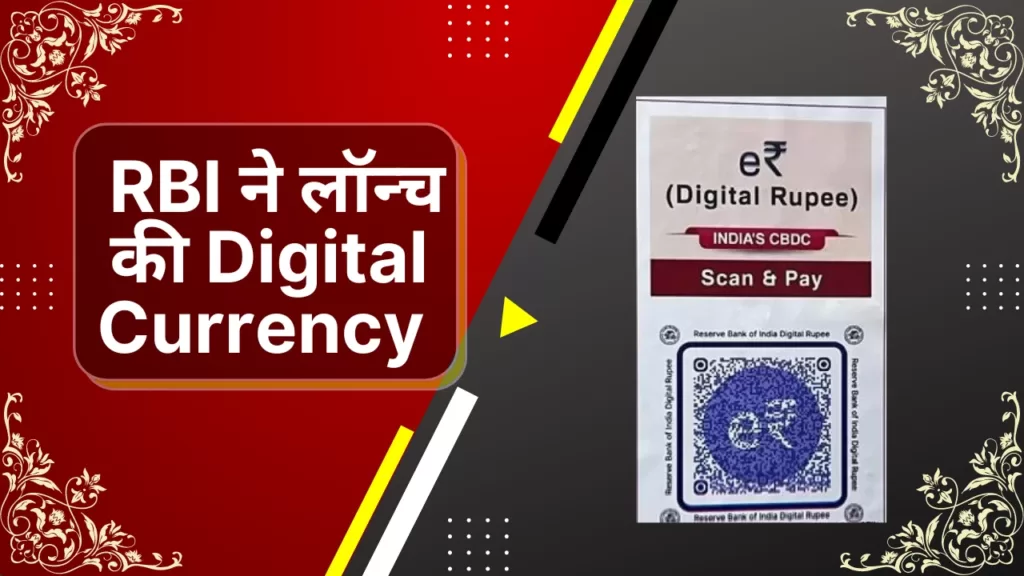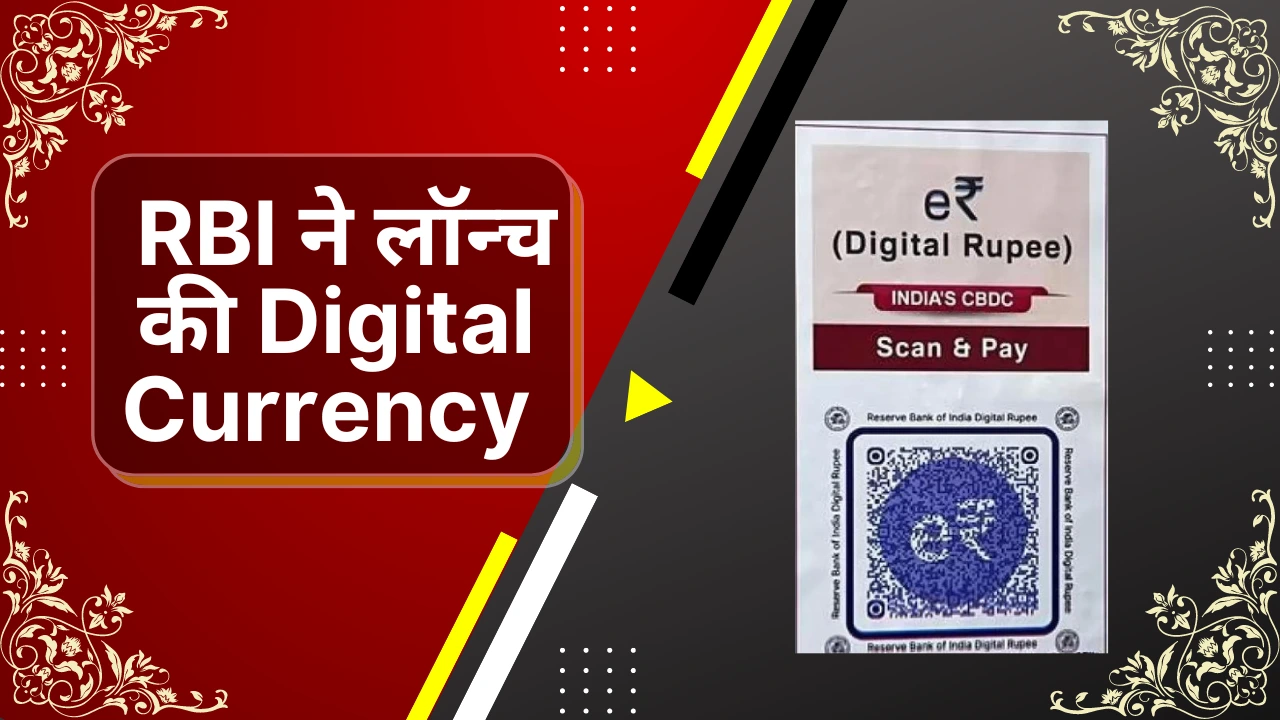
Digital currency क्या है ?
भारतीय ऱिजर्व बैंक ने डिजिटल रुपया (Digital currency) लॉन्च किया है, हलाकि ये अभी पायलट योजना है | लेकिन RBI ने आम जनता के पास पहुंचने में जुटे हुए है |
भारतीय रिज़र्व बैंक अपने केंद्रीय बैंक डिजिटल मुद्रा (CBDC) के पायलट को लॉन्च करने के लिए तैयार है, जिसे वह डिजिटल रूप में कानूनी निविदा के रूप में वर्गीकृत करता है। आमतौर पर डिजिटल रुपये के रूप में जाना जाता है, यह मौजूदा मुद्राओं के बराबर विनिमय योग्य होगा और भुगतान और मूल्य के सुरक्षित भंडारण के लिए स्वीकार्य माना जाएगा।
जैसा कि आप सभी जानते UPI ट्रांजेक्शन जैसे Google Pay, PhonePe & Paytm से अगर किसी दुकान से लिए गए समान का भुगतान उनके काउंटर पे लगये गए QR CODE को स्कैन करके करते है तो उसमे इंटरनेट की आवश्यकता होती है लेकिन ये जो Digital Currency लॉन्च किया गया है, बिना इंटरनेट के एक दूसरे का भुगतान किया जायेगा
Digital Currency का शुरुआत में उपयोग कहा हुआ ?
इस डिजिटल करेंसी का फ़िलहाल भारत के राज्य मुम्बई, नई दिल्ली, बेंगलुरु और भुनेश्वर में इस्तेमाल किये जा रहे है | पहले चरण में चार बैंक जैसे- SBI, ICICI, Yes Bank and IDFC First Bank इसमें जुड़े हुए है |
Digital Currency Lunch in India: Why You Should Care
As the world continues to move towards a digital-first economy, digital currency is becoming increasingly important. India has recently taken a big step forward in embracing this new technology by launching its first digital currency lunch in India. This is an exciting development that could have huge implications for the Indian economy and citizens, making it something worth paying attention to. In this blog post, we’ll explore why digital currency lunch in India is something you should be aware of.
What is digital money?
A sort of digital asset that is protected by cryptography is called digital money, commonly referred to as cryptocurrency or virtual cash. It runs independently of conventional banking systems and is not issued by any government or central bank. Decentralized, or not under the jurisdiction of a single organisation or institution, is the term used to describe digital currencies. On a blockchain, a distributed ledger, they only exist as computer code. Digital currency transactions are verified and recorded on the blockchain, which makes them safe and unchangeable.
Digital currencies are utilised as a form of payment because they enable faster and more cost-effective money transfers than traditional banking systems. Users can invest in digital assets and maintain track of their investments by using digital currencies to store and track value. Popular digital currencies include Ripple, Litecoin, Ethereum, and Bitcoin. These cryptocurrencies are all founded on the same decentralisation and security concepts, but each has its own features and advantages.
What is digital currency?
Digital currency, also known as a cryptocurrency or virtual currency, is a type of digital asset that is secured by cryptography. It is not issued by any government or central bank and operates independently of traditional banking systems. Digital currencies are decentralized, meaning that they are not controlled by any single entity or institution. They exist solely as computer code on a distributed ledger known as a blockchain. Transactions in digital currencies are verified and recorded on the blockchain, making them secure and immutable.
Digital currencies are used as a means of payment, allowing users to transfer funds with minimal fees and in a much shorter amount of time than traditional banking systems. Digital currencies are also used to store and track value, allowing users to invest in digital assets and keep track of their investments. Examples of popular digital currencies include Bitcoin, Ethereum, Litecoin, and Ripple. Each of these cryptocurrencies has its own unique features and benefits, but all are based on the same principles of decentralization and security.
How digital currencies are used in India
Digital currencies, also known as cryptocurrencies, are digital assets designed to act as a medium of exchange for goods and services. Cryptocurrencies are gaining traction in India, with the Reserve Bank of India (RBI) recently launching a nationwide digital currency lunch.
In India, digital currencies are being used to facilitate financial transactions, making them more accessible to users who may not have access to traditional banking. In addition, these digital currencies offer lower transaction fees than traditional payment options such as credit cards or bank transfers. This makes digital currencies an attractive option for both consumers and businesses.
Furthermore, digital currencies are becoming increasingly popular among investors in India. Investors are attracted to the potential of digital currency investments, which can be seen in the rise in value of Bitcoin, Ethereum and other leading digital currencies. Investors can use digital currencies as an alternative form of investment, similar to stocks and bonds, but with potentially higher returns.
Finally, digital currencies are being used as a form of remittance for Indians living abroad. By using digital currencies, remittances are faster and cheaper than traditional remittance services. This means that more of the money is going to those who need it most, instead of being lost in fees and commissions.
All in all, digital currencies are becoming increasingly popular in India and are being used for a variety of purposes. From facilitating transactions to providing investment opportunities, digital currencies are proving to be a viable alternative to traditional financial systems. As more people become aware of the potential benefits of these digital assets, we are likely to see an even greater uptake in their usage.
The benefits of digital currency
Digital currencies have the potential to revolutionize the way we transact and access financial services. By leveraging distributed ledger technology, digital currencies offer fast, secure, and low-cost payments that can be used across borders. This allows individuals and businesses to quickly and efficiently move money around the world without costly third-party involvement.
Digital currencies also offer unique features that make them attractive for both consumers and businesses. For instance, many digital currencies are decentralized, meaning they are not controlled by a single authority or entity. This makes them more resistant to fraud and censorship and provides more control to the user. Additionally, digital currencies are often much cheaper to use than traditional payment methods, as transaction fees are generally much lower than those associated with credit card or bank transfers.
Furthermore, digital currency networks can provide access to financial services to those who don’t have access to traditional banking systems. By providing an alternative form of money, these digital currencies can open up new opportunities to people in developing countries or in places where access to traditional banking infrastructure is limited.
Finally, digital currencies provide a layer of privacy that isn’t available with other payment methods. Since digital currency transactions are tracked on a public ledger, users can remain anonymous while still securely making transactions. This is especially beneficial for those who want to keep their financial information private.
In summary, digital currencies offer many advantages that make them an attractive option for both consumers and businesses. They provide fast and secure payments that can be used across borders, are often much cheaper to use than traditional payment methods, and provide users with additional privacy benefits. As digital currencies become increasingly popular in India, it’s important for consumers to understand the risks and benefits so they can make informed decisions about how they choose to transact.
The risks of digital currency
As with any financial investment, there are risks associated with digital currencies. Because they are decentralized and not regulated by any central authority, digital currencies are vulnerable to fraud and manipulation. In addition, their value is volatile and can fluctuate rapidly. As a result, people who invest in digital currencies may be subject to significant losses.
The security of digital currency systems is also a major concern. Exchanges and online wallets can be hacked, resulting in the theft of digital funds. Furthermore, hackers may attempt to manipulate the blockchain, resulting in double-spending or other malicious activities.
Finally, since digital currencies are not legal tender in India, users may be exposed to legal risks. Although there are no laws prohibiting their use, the government has yet to provide a clear stance on digital currencies and the related regulations. This could lead to uncertainty for businesses and investors who rely on digital currency transactions.
In short, digital currency poses various risks and should be handled with caution. Those who choose to invest in digital currencies should understand the potential risks and take steps to protect their investments.
